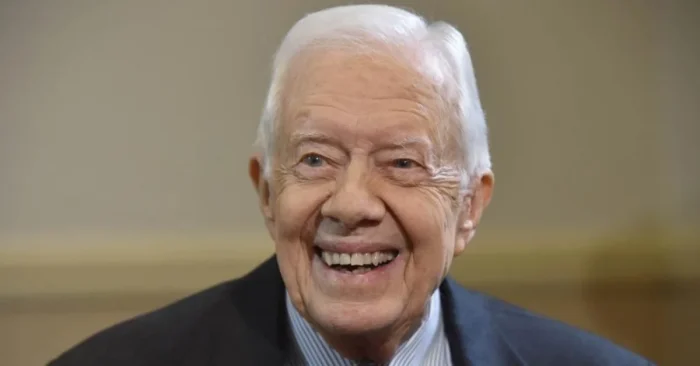Jimmy Carter Career and Life Style
Early Life and Background
James Earl Carter Jr., widely known as Jimmy Carter, was born on October 1, 1924, in Plains, Georgia. He grew up in a rural farming community where his family worked on peanut farming. His father, James Earl Carter Sr., was a businessman and farmer, while his mother, Lillian Gordy Carter, worked as a nurse and inspired his sense of compassion. The values of hard work, modesty, and service shaped Carter’s early years and prepared him for a life dedicated to leadership and humanitarian service.
Military Service and Education
After graduating from high school, Carter attended the United States Naval Academy, where he earned a reputation for discipline and intelligence. He served in the U.S. Navy as a submariner and was deeply involved in America’s nuclear submarine program under Admiral Hyman Rickover. However, following his father’s death in 1953, Carter resigned from active duty to return to Georgia and manage the family peanut farm. His naval career not only gave him technical expertise but also instilled in him a strong sense of duty and commitment.
Rise in Politics
Carter entered politics at the state level, serving in the Georgia State Senate from 1963 to 1967. His strong advocacy for civil rights and his opposition to racial segregation set him apart during a period of social change in the South. In 1970, he successfully ran for governor of Georgia, gaining national attention for promoting racial equality and progressive reforms. His emphasis on honesty, transparency, and morality helped him establish credibility as a leader beyond Georgia.
Presidency of the United States
In 1976, Carter won the Democratic nomination and defeated Gerald Ford to become the 39th President of the United States. His presidency focused on energy policy, environmental protection, and human rights. He created the Department of Energy and emphasized renewable resources at a time of rising energy concerns. Internationally, Carter is best remembered for brokering the Camp David Accords in 1978, which brought peace between Egypt and Israel. Despite these achievements, his administration struggled with economic inflation, the Iran hostage crisis, and challenges in foreign policy, which overshadowed some of his domestic reforms. He lost his reelection bid in 1980 to Ronald Reagan.
Post-Presidency Humanitarian Work
After leaving the White House, Carter became one of the most active former presidents in American history. He founded The Carter Center in 1982, dedicated to promoting democracy, human rights, and global health. Under his leadership, the center worked on eradicating diseases like Guinea worm and provided election monitoring in dozens of countries. His tireless efforts in humanitarian work made him a respected global figure. In 2002, Carter received the Nobel Peace Prize for his commitment to peace and international cooperation.
Personal Life and Values
Jimmy Carter married Rosalynn Smith in 1946, and the two shared a lifelong partnership dedicated to family, faith, and service. They raised four children and often worked together on humanitarian projects. Known for his strong Christian faith, Carter remained active in teaching Sunday school well into his later years. His modest lifestyle, humility, and devotion to service distinguished him from many other modern political leaders. Even after facing health challenges, he continued to inspire through his resilience and optimism.
Awards and Achievements
Beyond the Nobel Peace Prize, Carter received numerous awards and honors recognizing his humanitarian efforts. His leadership at The Carter Center resulted in significant progress in disease eradication and democracy promotion. He also became an accomplished author, writing books on politics, faith, and history. His long life of service reflects his belief in peace, justice, and compassion for others. Jimmy Carter Biography emphasizes that his legacy is not only his presidency but also his unparalleled post-presidential contributions to global society.
Conclusion
Jimmy Carter Biography tells the story of a man who rose from humble beginnings to the highest office in the United States and later became one of the most respected humanitarian leaders in the world. His presidency had both successes and struggles, yet his post-presidential work defined him as a symbol of peace, service, and integrity. Carter’s life remains an example of how leadership and compassion can change the world.
Frequently Asked Questions (FAQs)
When was Jimmy Carter born?
He was born on October 1, 1924, in Plains, Georgia.
What number president was Jimmy Carter?
Jimmy Carter served as the 39th President of the United States from 1977 to 1981.
What is Jimmy Carter best known for?
He is best known for brokering the Camp David Accords, founding The Carter Center, and his humanitarian work worldwide.
Did Jimmy Carter win the Nobel Peace Prize?
Yes, he received the Nobel Peace Prize in 2002 for his efforts to promote peace and human rights.
What did Jimmy Carter do after his presidency?
After leaving office, he dedicated his life to humanitarian causes, global health initiatives, and democracy promotion through The Carter Center.






